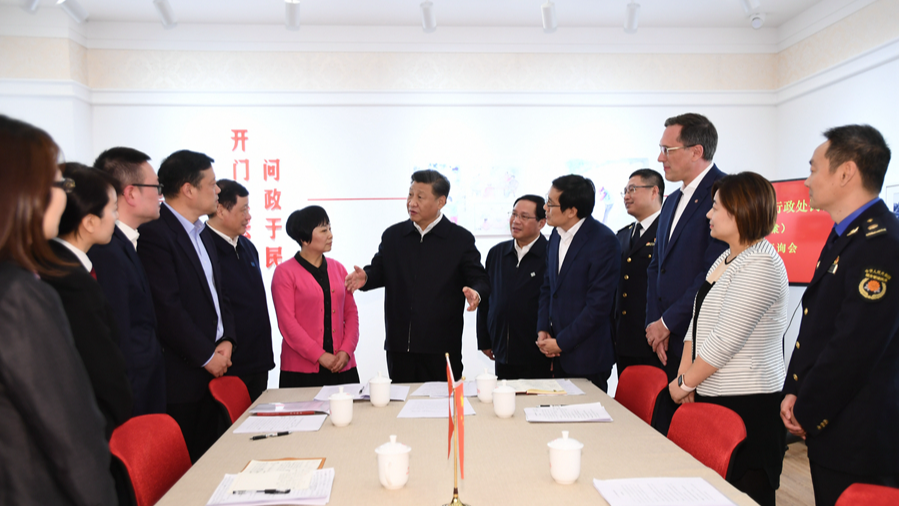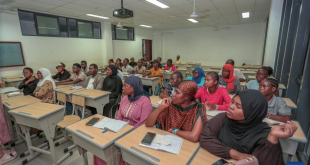Published: November 05,2024
By Xin G

Chinese President Xi Jinping visits the Gubei civic center in Changning District, east China’s Shanghai, November 2, 2019. /Xinhua
This year marks the fifth anniversary of the introduction of a key concept, “whole-process people’s democracy.” On November 2, 2019, during a visit to the Gubei civic center in Shanghai, President Xi Jinping first articulated the idea, emphasizing, “We are following a path of socialist political development with Chinese characteristics, and our people’s democracy is a whole-process democracy.”
Whole-process people’s democracy has shown remarkable dynamism and vitality. There are at least four reasons that explain the robustness of this type of democratic practice.
It adheres to a people-centered approach. The principle of prioritizing the public as central actors ensures that citizens’ voices play an integral role in shaping decisions. By establishing mechanisms to safeguard citizens’ rights to information, participation, expression, and oversight, whole-process people’s democracy moves beyond theoretical guarantees to fully engage citizens in the decision-making process. This involves both local and national levels, allowing for direct feedback from communities to influence policies. For instance, the People’s Congress system allows representatives from diverse sectors to propose policies and resolutions reflecting the genuine concerns of the populace.
Second, the inclusiveness and authenticity of democratic practice. The broad inclusivity emphasizes participatory governance, aiming to provide a channel for citizens to influence policies. Reports from the Standing Committees of the National People’s Congress and the top advisory body, the Chinese People’s Political Consultative Conference, indicate that proposals from representatives are deliberated and implemented.
This responsive system uses a problem resolution-oriented approach, converting public feedback into tangible results and elevating democracy from a procedural formality to an essential method for addressing real issues. The emphasis on real outcomes reinforces democratic efficacy, making whole-process people’s democracy an instrumental process rather than a symbolic gesture.
Third, unified democratic practice and institutional stability. According to the white paper China’s Democracy, whole-process people’s democracy has achieved the unity of procedural democracy and substantive democracy, direct democracy and indirect democracy, and the will of the people and the will of the state. It ensures that the democratic process and the outcomes are aligned, and that the formal procedures of democracy are matched with their substantive content.
The 20th National Congress of the Communist Party of China (CPC) in 2022 issued comprehensive plans for developing whole-process people’s democracy and safeguarding the people’s role as masters of the country, while the third plenary session of the 20th CPC Central Committee in July this year laid out further steps for improving the institutional framework.
Fourth, the growing confidence in and commitment to democratic development. China’s confidence in its democratic development has strengthened with whole-process people’s democracy, broadening its governance approach and contributing to a unique democratic ethos. The impact of this confidence is visible in practical achievements, including the eradication of extreme poverty and the establishment of a moderately prosperous society. These successes illustrate the efficacy of this type of democracy, bolstering public belief in a system capable of adapting to challenges and addressing critical social issues.
China’s whole-process people’s democracy model also offers instructive insights for other countries, particularly regarding the adaptability of democratic practices.
Members of the 14th National Committee of the Chinese People’s Political Consultative Conference leave the Great Hall of the People in Beijing, China, after the closing meeting of the second session of the committee, March 10, 2024. /Xinhua
China’s approach highlights the necessity of tailoring democratic practices to the unique historical, cultural and socioeconomic conditions of each country. The whole-process people’s democracy model underscores that democracy cannot be a one-size-fits-all solution. For other nations, this suggests the potential value of exploring locally adapted forms of democratic governance that align with their cultural and structural realities.
This democratic pathway offers a crucial insight: Democracy has no fixed model, and prioritizing national identity and context over imported systems can lead to more effective governance.
Ensuring inclusive participation is essential. One of the cornerstones of whole-process people’s democracy is its commitment to broad participation. This suggests to other nations the importance of involving all sectors of society in governance, not merely through periodic elections but through ongoing engagement mechanisms, whether consultative, participatory or deliberative. By fostering a participatory democracy, countries might enhance public trust and accountability in decision-making processes.
Finally, the rule of law serves as a foundational element of democracy. By establishing a legal framework that underpins democratic rights, China emphasizes stability and legitimacy in democratic governance.
This aspect of whole-process people’s democracy reflects a lesson for other countries: A well-defined rule of law can stabilize democratic practices, providing legal avenues for public engagement and ensuring that democratic processes are both orderly and effective. Nations that prioritize rule of law as a safeguard for democracy can strengthen democratic resilience and promote adherence to democratic principles.
Whole-process people’s democracy demonstrates the value of dynamic, people-centered governance rooted in a distinct national context. As the model matures, it serves as a potential template for countries exploring democratic practices that resonate with local conditions, broad inclusivity, and a rule-of-law foundation. In practice, this approach has made significant contributions to global political civilization, showcasing an adaptable democratic path that responds directly to the needs of citizens.
Xin Ge, a special commentator on current affairs for CGTN, is a research fellow at the Institute of Public Policy and Governance, Shanghai University of Finance and Economics (SUFE), and an associate professor at the School of Public Economics and Administration, SUFE.
Cgtn.com
 Africa -China Review Africa -China Cooperation and Transformation
Africa -China Review Africa -China Cooperation and Transformation
